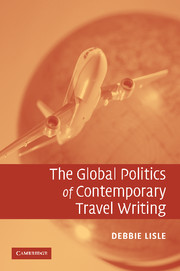Book contents
- Frontmatter
- Contents
- List of illustrations
- Preface
- ‘Travelogue’
- 1 Introduction: the global imaginary of contemporary travel writing
- 2 Between fact and fiction: the generic boundaries of travel writing
- 3 The cosmopolitan gaze: rearticulations of modern subjectivity
- 4 Civilising territory: geographies of safety and danger
- 5 Looking back: utopia, nostalgia and the myth of historical progress
- 6 Engaging the political: contemporary travel writing and the ethics of difference
- Bibliography
- Index
1 - Introduction: the global imaginary of contemporary travel writing
Published online by Cambridge University Press: 22 September 2009
- Frontmatter
- Contents
- List of illustrations
- Preface
- ‘Travelogue’
- 1 Introduction: the global imaginary of contemporary travel writing
- 2 Between fact and fiction: the generic boundaries of travel writing
- 3 The cosmopolitan gaze: rearticulations of modern subjectivity
- 4 Civilising territory: geographies of safety and danger
- 5 Looking back: utopia, nostalgia and the myth of historical progress
- 6 Engaging the political: contemporary travel writing and the ethics of difference
- Bibliography
- Index
Summary
As literary representations of journeys across the globe, travelogues express political commitments that are barely visible beyond their received status as a minor literary genre. This book politicises travelogues by revealing their connection to the ‘serious’ business of world affairs, and their significance to the study and practice of global politics. It argues that the quasi-fictional genre of travel writing is at least as useful for understanding issues of international importance as the policy documents, government press releases, parliamentary debates and media stories that are usually privileged in this context. In fact, travelogues have a distinct advantage because they are read widely by a number of people, and thus provide valuable information about how artefacts of popular culture produce common assumptions about power relations at the international level. Historically, travel writing participated in the international realm by disseminating the goals of Empire: stories of ‘faraway lands’ were crucial in establishing the unequal, unjust and exploitative relations of colonial rule. While many post-colonial scholars have examined the role of travel writing during Empire, I am particularly interested in how contemporary travel writing is addressing its colonial legacy by engaging – or not engaging – with wider intellectual and cultural debates about global politics. The contemporary travel writer's efforts to abandon his/her colonial heritage is understandable: it mimics the efforts of statesmen, diplomats, civil servants, journalists, researchers and scholars who are currently searching for more equal and just ways of arranging our post-colonial world.
- Type
- Chapter
- Information
- The Global Politics of Contemporary Travel Writing , pp. 1 - 26Publisher: Cambridge University PressPrint publication year: 2006



